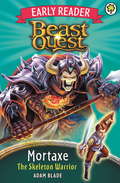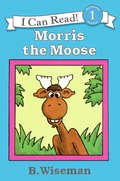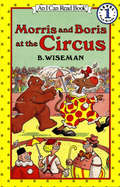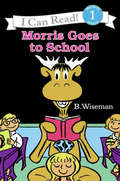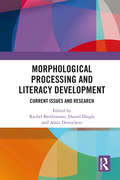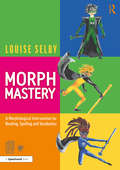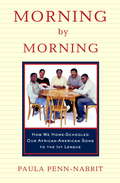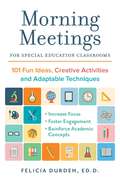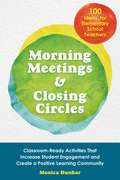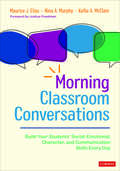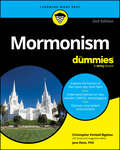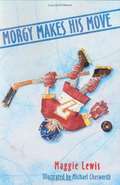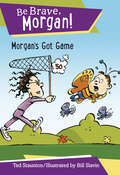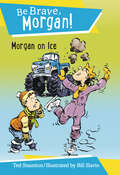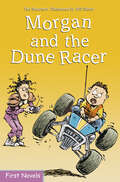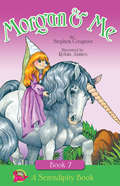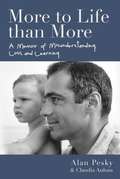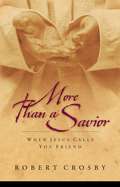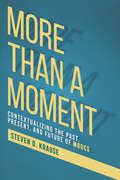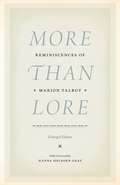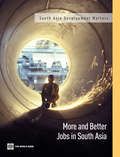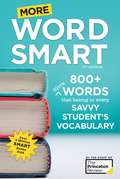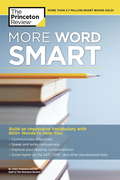- Table View
- List View
Mortaxe the Skeleton Warrior (Beast Quest Early Reader #5)
by Adam BladeMortaxe the Skeleton Warrior has risen from the grave! He controls Avantia's six Good Beasts with dark magic, forcing them to fight Tom in a gladiatorial battle. Tom and his companions are about to face the most terrifying Quest of their lives...Beast Quest Early Readers, adapted from the original bestselling Beast Quest Specials, are perfect for children learning to read and for families to enjoy reading together. The text is vetted by a literacy expert and there are bright new full-colour illustrations throughout.Look out for Beast Quest Early Reader 6: Ravira, Ruler of the Underworld in September!
Morris the Moose (I Can Read Level 1)
by B. WisemanThis classic story about a mixed-up moose is perfect for fans of Amelia Bedelia, Danny and the Dinosaur, and anyone who loves silly stories and fun word play.The cow, the deer, and the horse have four legs and a tail, just like Morris. But none of these animals is a moose! These different animals have one thing in common—their friendship. Morris the Moose is a Level One I Can Read, great for shared reading with a child, and especially wonderful for reluctant readers.
Morris and Boris at the Circus (I Can Read Level 1)
by B. WisemanThis classic story about a mixed-up moose and his exasperated friend Boris is perfect for fans of Amelia Bedelia, Danny and the Dinosaur, and anyone who loves silly stories and fun word play.Morris the Moose has never been to the circus, so his friend Boris takes him there. When the ringmaster invites Morris to be part of the show, the fun begins for everyone—except poor Boris!This classic silly Level One I Can Read is perfect for shared reading with a child.
Morris Goes to School (I Can Read Level 1)
by B. WisemanMorris the Moose can’t read or count, so he decides to go to school. After a day of ABCs and 123s, Morris is thrilled with all that he has learned.This classic silly Level One I Can Read is perfect for shared reading with a child. For fans of Danny and the Dinosaur, Sammy the Seal, or anyone who loves to read silly stories about animals.
Morphological Processing and Literacy Development: Current Issues and Research
by Alain Desrochers Rachel Berthiaume Daniel DaigleSynthesizing a range of studies on morphological processing from the past 30 years, this edited collection presents the current state of knowledge on morphological processing and defines classroom practices to help students conceptualise the role of morphology in reading, spelling, and vocabulary development. Research has increasingly indicated the importance of morphological tasks in relation to reading, spelling, and vocabulary acquisition in the classroom. Chapter authors present the theoretical considerations guiding morphological processing research to date, address the use of morphology with reference to different populations of learners, and propose effective and innovative instructional strategies for integrating morphology in the classroom.
Morph Mastery: A Morphological Intervention for Reading, Spelling and Vocabulary
by Louise SelbyMorph Mastery is an accessible, practical guide designed to support learners with specific learning difficulties (SpLD) who are struggling with spelling, reading and vocabulary. It is an effective, research-based and fun solution for when phonics-based teaching has run its course. Understanding the morphological regularities in English helps to support both spelling and reading comprehension, yet there are few practical interventions that take a morphological approach. Morph Mastery combines this exciting new approach with tried-and-tested teaching methods that work. The activities in this book follow three engaging ninja-like characters, Prefa, Root and Sufa, who represent the three core components of morphology (prefixes, root words and suffixes) and use their sceptres to craft words. Key features include: • Exciting and engaging activities and games, designed to be used by individuals or small groups • Detailed, curriculum-linked assessments, enabling specific target setting • Photocopiable and downloadable activity sheets and resources Written in a user-friendly tone, for teaching assistants, teachers and other professionals with little or no specialist knowledge, this book is a must for any school with struggling readers and writers aged 9–13.
Morning by Morning
by Paula Penn-NabritHome schooling has long been regarded as a last resort, particularly by African-American families. But in this inspirational and practical memoir, Paula Penn-Nabrit shares her intimate experiences of home-schooling her three sons, Charles, Damon, and Evan. Paula and her husband, C. Madison, decided to home-school their children after racial incidents at public and private schools led them to the conclusion that the traditional educational system would be damaging to their sons' self-esteem. This decision was especially poignant for the Nabrit family because C. Madison's uncle was the famed civil rights attorney James Nabrit, who, with Thurgood Marshall, had argued Brown v. Board of Education before the U. S. Supreme Court; to other members of their family, it seemed as if Paula and C. Madison were turning their backs on a rich educational legacy. But ultimately, Paula and C. Madison felt that they knew what was best for their sons. So in 1991--when Evan was nine and twins Charles and Damon were eleven--the children were withdrawn from the exclusive country day school they'd been attending. In Morning by Morning, Paula Penn-Nabrit discusses her family's emotional transition to home schooling and shares the nuts and bolts of the boys' educational experience. She explains how she and her husband developed a curriculum, provided adequate exposure to the arts as well as quiet time for reflection and meditation, initiated quality opportunities for volunteerism, and sought out athletic activities for their sons. At the end of each chapter, she offers advice on how readers can incorporate some of the steps her family took--even if they aren't able to home-school; plus, there's a website resource guide at the end of the book. Charles and Damon were eventually admitted to Princeton, and Evan attended Amherst College. But Morning by Morning is frank about the challenges the boys faced in their transition from home schooling to the college experience, and Penn-Nabrit reflects on some things she might have done differently. With great warmth and perception, Paula Penn-Nabrit discusses her personal experience and the amazing outcome of her home-schooling experience: three spiritually and intellectually well balanced sons who attended some of the top educational institutions in this country. What we learned from home schooling: -Use your time wisely. -Education is more than academics. -The idea of parent as teacher doesn't have to end at kindergarten. -The family is our introduction to community. -Extended family is a safety net. -Yes, kids really do better in environments designed for them. -Travel is an education. -Athletics is more than competitive sports. -Get used to diversity. -It's okay if your kids get angry at you--they'll get over it! -from Morning by Morning
Morning Musings: Weekly Encouragement for the Educator’s Soul
by Stacey ReedWith school violence, insufficient resources, overcrowded classrooms, and inadequate pay, educators encounter a variety of challenges that can potentially pollute their souls. If allowed, such pollution can interfere with their efforts to teach, lead, and serve their students.When faced with intense challenges, educators will need power to encourage themselves and continue in the charge set before them. A Christian educator and professor, Stacey offers educators weekly encouragement to maintain a cleansed soul and teach with the purest of heart, intention, and divine guidance.Morning Musings offers educators:36 weekly musings--one for each week in a semester--that includes a Scriptural Reading, Weekly Teaching, Weekly Application, and Reflection.Relevant biblical strategies to re-invigorate their soul by cultivating a relationship with Jesus Christ.Relevant biblical strategies to fulfill their duties of teaching, serving, and leading with divine guidance.Relevant biblical strategies to transform their lives, so they can transform the lives of their students.As you read and meditate, let each musing encourage, strengthen, and renew your soul as you prepare to teach, lead, and serve.
Morning Meetings for Special Education Classrooms: 101 Fun Ideas, Creative Activities and Adaptable Techniques
by Dr. Felicia Durden, Ed.D.A complete guide for improving the focus and engagement of your special education students by starting the day off rightUse a morning meeting to jump-start your students&’ day! This simple but effective classroom technique has been proven to help students learn better, build friendships, improve behavior and gain confidence.Offering fun games, great songs and other engaging activities, this book&’s 101 ready-to-use ideas are sure to help your students experience remarkable progress in:• Math and reading• Team-building• Planning and communication• Science and technology• Goal-setting• Organization• Problem-solving• Role-playing• Fulfilling a classroom job• Creative arts
Morning Meetings and Closing Circles: Classroom-ready Activities That Increase Student Engagement And Create A Positive Learning Community (Books For Teachers Ser.)
by Monica DunbarTransform the way you start and end the school day with the fun, interactive, and adaptable lessons, exercises, and activities in this easy-to-use classroom management resource designed with busy teachers in mind.Daily classroom routines are proven to engage students, build trust, and support learning on all levels. But finding fun and interesting ideas for every day is difficult, not to mention figuring out how to incorporate them into an already jam-packed schedule. Morning Meetings and Closing Circles is here to help. From establishing rules and expectations to time management techniques and helpful meeting props, this book will impart the ins and outs of starting and ending each day with an effective meeting. With 100 classroom-ready ideas, connecting with your students throughout the school day has never been easier. Plus, with suggestions for tailoring activities to your own unique classroom, you will be able to create more meaningful experiences for your students. Build a safe community that fosters positive attitudes and academic growth by bookending the day with a morning meeting and a closing circle.
Morning Classroom Conversations: Build Your Students′ Social-Emotional, Character, and Communication Skills Every Day
by Maurice J. Elias Nina A. Murphy Kellie A. McClainGet students thinking and learning by getting them talking! Transitioning from home to school can be chaotic—but it doesn’t have to be. When you make Morning Classroom Conversations (MCCs) a regular part of your homeroom or advisory period, you give students a safe space to practice critical and creative thinking, build active listening skills, learn to respectfully disagree with others, and strengthen peer relationships… all while improving overall classroom climate. Written by expert practitioners in the area of SEL, this book provides teachers, school counselors, and other conversation leaders with a wealth of tools to guide successful MCCs from start to finish—in just 10-15 minutes! Features include: Three calendar years’ worth of thought-provoking prompts and themes An overview of the underlying structure and goals of MCCs Sample scripts Vignettes and student and teacher voices Adolescents need to feel heard and understood—by adults and by their peers. MCCs teach them to channel scattered thoughts and strong feelings into dynamic discussions while also strengthening social, emotional, and character development and building the skills they will need to achieve their goals as they transition to adult life.
Morning Classroom Conversations: Build Your Students′ Social-Emotional, Character, and Communication Skills Every Day
by Maurice J. Elias Nina A. Murphy Kellie A. McClainGet students thinking and learning by getting them talking! Transitioning from home to school can be chaotic—but it doesn’t have to be. When you make Morning Classroom Conversations (MCCs) a regular part of your homeroom or advisory period, you give students a safe space to practice critical and creative thinking, build active listening skills, learn to respectfully disagree with others, and strengthen peer relationships… all while improving overall classroom climate. Written by expert practitioners in the area of SEL, this book provides teachers, school counselors, and other conversation leaders with a wealth of tools to guide successful MCCs from start to finish—in just 10-15 minutes! Features include: Three calendar years’ worth of thought-provoking prompts and themes An overview of the underlying structure and goals of MCCs Sample scripts Vignettes and student and teacher voices Adolescents need to feel heard and understood—by adults and by their peers. MCCs teach them to channel scattered thoughts and strong feelings into dynamic discussions while also strengthening social, emotional, and character development and building the skills they will need to achieve their goals as they transition to adult life.
Mormonism For Dummies
by Jana Riess Christopher Kimball BigelowExplore one of the fastest-growing religions in the world The Church of Jesus Christ of Latter-Day Saints is the first Christian faith to be developed in America, and today the Church is home to millions—both inside and outside the United States. Mormonism For Dummies, 2nd Edition is a valuable tool for individuals interested in learning more about the beliefs and practices of the widely-practiced Latter-day Saint faith. In this informative book, you'll explore the different denominations of the Church, recent changes to the Church's customs and practices'which also covers why the Church encourages a shift away from the term “Mormon” and more. Inside, you'll: Discover the history and origins of the Church of Latter-Day Saints Understand the Church's official stances on areas, including race, the status of women, and polygamy Examine subjects like religious fundamentalism and orthodoxy through the lens of practicing LDS members A must-read for anyone interested in the rituals, customs, beliefs, and politics of the Church of Latter-Day Saints, Mormonism For Dummies, 2nd Edition gives you the straightforward and unbiased info you need to understand this nuanced faith.
Morgy Makes His Move
by Maggie LewisMorgy hates being the new kid in a new school in a new town in a new state. He wishes he were back in California. Here in Massachusetts he has to contend with Ferguson, who's older and seems to have singled out Morgy to pick on. Ferguson is even there when Morgy tries to learn how to play hockey, and he never misses a chance to dump Morgy on the ice. And hockey becomes even more humiliating when Morgy is demoted from the ten-and-unders to the seven-and-unders, where he's the oldest kid on the team. Each day brings more things to get used to, from weird Boston accents to surviving the blizzard of the century. Gradually, though, Morgy begins to figure out life in Puckett Corner and learns that he just might fit in after all.
Morgan's Got Game (Be Brave, Morgan!)
by Ted StauntonMorgan is left out of the loop when everyone begins bringing their Robogamer Z7's to school, linking up online with one another and playing at recess and lunch. Even Aldeen, the Godzilla of Grade Three, has one. But when the other kids start to suspect that Aldeen is faking her gaming, Morgan has to decide whether or not to stand up to the bullies who are teasing her. With a situation young readers will recognize and enjoy, and a character they can easily identify with, this is a book that will appeal to kids starting to read on their own. The dyslexia-friendly features of the book include easier-to-read typography, page layout, and reduced-contrast paper stock, along with illustrations on every double-page spread that enhance the text.
Morgan on Ice (Be Brave, Morgan!)
by Ted StauntonMorgan doesn't like to skate, and he's determined not to learn. What he really wants to do is go to see Monster Truck-A-Rama with Charlie. Aldeen is not impressed since Morgan already agreed to go to Princesses on Ice with her. Can Morgan avoid conflict and keep everyone happy, or is he skating on thin ice? With a situation young readers will recognize and enjoy, and a character they can easily identify with, this is a book that will appeal to kids starting to read on their own. The dyslexia-friendly features of the book include easier-to-read typography, page layout, and reduced-contrast paper stock, along with illustrations on every double-page spread that enhance the text.
Morgan and the Dune Racer (Formac First Novels)
by Ted StauntonIt's Morgan's birthday and all he wants is Charlie's Thunderbolt Dune Racer. Aldeen snags it first from a yard sale, and Morgan gets mad. Really mad. Morgan's birthday brings him a surprise gift, and a lesson in friendship. Morgan and the Dune Racer, with its humorous tone and lively portrayals of Morgan and his buddies, will encourage young readers to learn awareness of their emotions and the value of not acting out every feeling that comes along.
Morgan and Me
by Stephen Cosgrove Robin JamesA magical story of a little princess who wants and needs to do everything "just a little bit later." Everything is put off until later -- until she meets Morgan the unicorn. A wonderful lesson to be learned by children of all ages.
More to Life than More: A Memoir of Misunderstanding, Loss, and Learning
by Alan Pesky Claudia AulumAt the age of thirty, just as everything was falling into place for him, Lee Pesky died of brain cancer. For his father, Alan, grief came with the realization that he had lost the chance to love Lee as he was—not as he wanted him to be. Ambitious, successful, and always striving for more, Alan had a hard time relating to a son who struggled with learning disabilities at a time when there was little understanding or help for kids who had them. Their relationship was complicated, and now, Lee was gone.More to Life than More is a memoir of misunderstanding, loss, and learning. After Lee&’s death, Alan&’s conception of more crumbles. He launches himself into keeping Lee&’s memory alive by helping kids in a way he wasn&’t able to help his son. It was too late to change his relationship with Lee, but he could create something positive and enduring from his loss: Lee Pesky Learning Center, a non-profit in Idaho dedicated to understanding and helping those with learning differences.In 25 years, LPLC has benefited more than 100,000 children and has become a national force for early childhood literacy. And for Alan, it has meant getting to know the son he had misunderstood and lost.
More than a Savior: When Jesus Calls You Friend
by Robert C. CrosbyHe's the King of kings and Lord of lords, the Savior and God with us. However, can we really know Jesus as our best friend? Robert C. Crosby shows us how we can experience Jesus in a new and intimate way -- the same way His friends knew Him. Drawing on the close relationships that Jesus had while on earth, the wisdom of great men and women of God through the ages, and personal experience, Crosby takes readers to that place of personal transformation. More than a passage, it is a day-by-day reality where deep abiding friendship takes hold. Side by side with Jesus, readers discover the greatest friendship in the universe as it was intended to be.From the Hardcover edition.
More than a Moment: Contextualizing the Past, Present, and Future
by Steven D. KrauseAs recently as 2012, massive open online courses (MOOCs) looked poised to revolutionize higher education, but in just a few years their flaws and problems have made them into a less relevant model. In More than a Moment, Steven D. Krause explores MOOCs and their continuing impact on distance learning in higher education, putting them in the context of technical innovations that have come before and those that will be part of the educational future. Krause writes about his own experiences as a participant in several MOOCs and the experiences of faculty who developed and taught MOOCs. Contrary to many early claims from educational entrepreneurs, they were never entirely “new,” and MOOCs and their aftermath are still at the heart of the tensions between nonprofit universities and for-profit entities, particularly online program management firms, in delivering distance education. While MOOCs are no longer a threat to education in the United States, they are part of the ongoing corporatization of education and remain part of conversations about experienced-based credit, corporate training, and open education. Presenting historical, student, teacher, and administrative perspectives, More than a Moment is a well-rounded treatment that will be of interest to academics and entrepreneurs interested in distance education, online pedagogy, online program management, and public-private partnerships in higher education.
More than Lore: Reminiscences of Marion Talbot
by Marion TalbotThe founding articles of the University of Chicago contained what was for the era a shocking declaration: “To provide, impart, and furnish opportunities for all departments of higher education to persons of both sexes on equal terms.” In a time when many still scoffed at educating women, the university was firmly co-ed from the very start. One of its first hires was Marion Talbot. Ready for the adventure of a lifetime, she set her sights on Chicago at a time when the city was still considered all but the Wild West. Talbot eventually became the University of Chicago’s first Dean of Women, influencing a generation of female students. Originally published in 1936, More than Lore is a unique firsthand account of the early days of the university, capturing the excitement and travails of life on an academic frontier. Talbot shares gossip from the faculty lounge, relays student antics in the dorms, and tells stories from the living rooms of Hyde Park. It’s also a fascinating look at life as an early twentieth-century college woman, with scandals over improper party invitations and underground sororities, petitions calling for more female professors, and campaigns to have students be known as “university women” instead of “college girls.” With Talbot as our guide, we reenter a lost world where simply to be a woman was to be a pioneer and where the foundations of the modern undergrad experience were being established.
More and Better Jobs in South Asia
by Pablo Gottret Reema Nayar Pradeep Mitra Gordon Betcherman Yue Man Lee Indhira Santos Mahesh Dahal Maheshwor ShresthaSouth Asia, which is home to more than 40 percent of the world s absolute poor, will contribute nearly 40 percent of the growth in the world s working age population over the next several decades. More and Better Jobs in South Asia attempts to answer three questions: # Has South Asia been creating an increasing number of jobs and better jobs? # What has determined the quality of job creation and what is the employment challenge going forward? # What demand- and supply-side bottlenecks need to be eased to meet South Asia s employment challenge in the face of intensifying demographic pressure? The region has created just under 800,000 jobs per month during the past two decades, a rate that broadly tracks growth in its working age population. The quality of jobs- measured in terms of higher wages for wage workers and lower poverty for the self-employed-has been improving, thanks to strong economic growth in some countries and massive out-migration and workers remittances elsewhere. But there is absolutely no room for complacency. South Asia will add between 1 million and 1.2 million new entrants to the labor force every month for the next two decades. Absorbing them into the labor force at rising levels of labor productivity is the crux of the employment challenge. Meeting the employment challenges calls for a reform agenda that cuts across sectors. It includes enhancing access to reliable electricity supply for firms in urban and rural settings, reducing corruption in dealings between firms and the state, facilitating access to land, strengthening transport links between town and country, focusing on better nutrition in early childhood, improving the quality of education to equip workers with relevant skills for the world of work, and protecting workers in both informal and formal sectors rather than protecting jobs for the few in the formal sector of the economy. Recognizing that South Asia is the most conflict-affected of the major regions in the world, the book also includes a chapter on how the challenges of job creation are magnified in such environments as well as some priorities going forward for labor market policies and programs. More and Better Jobs will be of interest to policy makers and their advisers, not only in South Asia but also in other parts of the world where creating better jobs is a significant challenge, as well as to the international development community and students of economics.
More Word Smart, 2nd Edition: 800+ More Words That Belong in Every Savvy Student's Vocabulary
by Princeton ReviewAN IMPRESSIVE VOCABULARY NEVER STOPS GROWING. More than a million people improved their vocabularies with the original Word Smart, but an educated and powerful vocabulary doesn’t stop growing with one book! Learning and effectively using the words in More Word Smart, 2nd Edition can help you get better grades, score higher on tests, and communicate more confidently at work.MORE WORD SMART includes: • More than 800 more words that belong in every savvy student's vocabulary • Lists of common usage errors • The most frequently-tested words on the SAT and other standardized tests • Lists of helpful word roots • Terms you need to know to understand classic literature, law, and religion
More Word Smart
by The Princeton ReviewBuild a More Impressive Vocabulary. Did you know that: • The word "noisome" has nothing whatsoever to do with noise? • "Ordinance" and "ordnance" have two distinct meanings? • An "errant" fool is a fool who is lost, while an "arrant" fool is one whose foolishness is obvious? If any of these facts caught you by surprise, then you need More Word Smart. More than one million people improved their vocabulary with the original Word Smart, but an educated and powerful vocabulary doesn’t stop growing with one book! All of words featured in More Word Smart belong in an impressive vocabulary. Learning and using these words effectively can help you get better grades, score higher on tests, and communicate more confidently at work.
